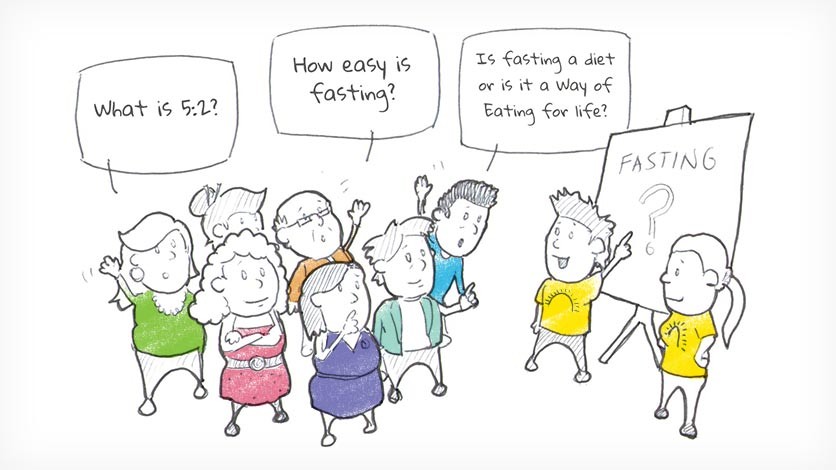 In Western cultures, the most common eating pattern consists of consuming three daily meals with snacks between meals. However, more and more research in the area of human nutrition, dieting and weight loss is challenging this traditional idea of how our nutritional habits should be.
In Western cultures, the most common eating pattern consists of consuming three daily meals with snacks between meals. However, more and more research in the area of human nutrition, dieting and weight loss is challenging this traditional idea of how our nutritional habits should be.
More studies have questioned not just what we eat, but also how we eat! Recently, fasting (or cleansing) has been at the centre of popular diets like the 5:2 diet, and has gained much attention from researchers and celebrities alike.
To fast is to abstain from all or some kinds of food for a specific period of time. In the well-known and popular 5:2 diet, the practice of fasting is applied by restricting your caloric intake on two days per week. This is one among many methods of fasting.

Let’s have a look at some of the benefits of fasting:
- Weight loss: Fasting can be a safe way to lose weight, as several studies have shown that intermittent fasting – fasting that is controlled within a set number of hours – improves the body’s ability to break down fat cells more effectively.
- Improves insulin sensitivity: Fasting has shown to have a positive effect on insulin sensitivity, allowing you to tolerate carbohydrates (sugar) better than if you didn’t fast. One studyshowed that after periods of fasting, insulin becomes more effective in telling cells to take up glucose from blood.
- Improves hunger regulation: To experience the true nature of hunger it would take anything from 12 to even 24 hours of fasting. This helps to regulate the hormones in your body so you receive the true hunger sensation. We know that obese individuals do not receive the correct signals to let them know they are full due excessive eating patterns. Think of fasting as a reset button: the longer you fast, the more your body can regulate itself to release the correct hormones and send correct signals to the body.
- Improve eating patterns: Fasting can be a helpful practice for those who find it difficult to establish a regular eating pattern due to work and other priorities. Intermittent fasting can allow you to eat at set times that fit your lifestyle, creating an eating structure around your existing routines and schedules.
- Fasting can improve your immune system: There is some early evidence that intermittent fasting can reduce free radical damage, regulate inflammatory conditions in the body, and starve off cancer cell formation. Fasting also reduces stress on the body’s digestive system, so that the body can focus on repair processes and fighting off infections.

Fasting has also received some criticism for some of its effects on the body, including:
- Cravings: After a period of fasting, research shows that people tend to crave foods that are high in starch, and sugar-based foods that are usually associated with a high calorie content. Giving into these cravings can affect blood sugar levels and cause insulin spikes, which (when repeated over prolonged periods) is associated with weight gain and type 2 diabetes.
- Binge eating: After periods of fasting where hunger is evident, it is common for people to counteract that hunger with binge-eating behavior. This means they pack in more calories than would be considered healthy for the body to consume in one sitting. Such eating behaviours following periods of fasting can reverse the intended effects from a weight management point of view.
- Short-term side effects: During periods of fasting, people may experience some discomfort and symptoms such as headaches, dizziness, lightheadedness, fatigue, low blood pressure, and abnormal heart rhythms. This may affect a person’s ability to perform certain tasks, such as operate machinery or drive a vehicle. Fasting could also cause flare-ups of certain conditions (e.g., gout, gallstones) and could impair the body’s ability to absorb certain medications. In some cases, fasting can also alter drug interactions in the body.
- Long-term side effects: It is possible that fasting could have a negative effect on some of the body’s organs, including the liver and kidneys, and may also interfere with regular vital bodily functions. These issues can arise from individuals not ingesting and absorbing enough micronutrients due to potentially decreased intake of vitamins and minerals. Abstaining from eating could also be potentially dangerous in individuals who are already malnourished. People with eating disorders, people suffering from digestive conditions, and cancer patients could be a risk of depleting the body’s energy stores if fasting encourages the body to breakdown fat and muscle to produce energy.
Like all forms of “dieting”, there are pros and cons to intermittent fasting. We are in the infancy of discovering the exact long-term impacts of intermittent fasting, and more clinical data is needed to confirm the benefits and drawbacks of such regimes. At present, there appear to be great benefits of controlled fasting in terms of weight loss and hormone control, however long-term data will shed light on the sustainability of this practice and its long-term health implications.
